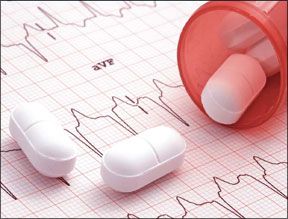Nicotinic acid, more commonly known as niacin, is the familiar B-complex vitamin that helps the body metabolize or break down carbohydrates, fats and protein into compounds that the body needs to maintain good health. When prescribed by a physician, high doses of niacin can increase "good HDL cholesterol by as much as 35 percent (about 40 percent of heart attacks and related cardiovascular problems occur in people with low HDL, and this is key to heart health because HDL cholesterol helps remove "bad" LDL cholesterol from the bloodstream and transports it to the liver for disposal. Niacin also can help reduce levels of artery-clogging triglycerides. Niacin typically is prescribed alongside statins to people with high LDL levels and low HDL, and niacin appears to work even better when used in combination with statins. However, despite the fact that niacin can reduce the risk of heart attacks and strokes, it isnt prescribed as widely as statins. One reason is that it causes side-effects that can affect patient compliance-its thought that up to one-third of patients cannot tolerate high-dose niacin.
To continue reading this article or issue you must be a paid subscriber.
Sign in






